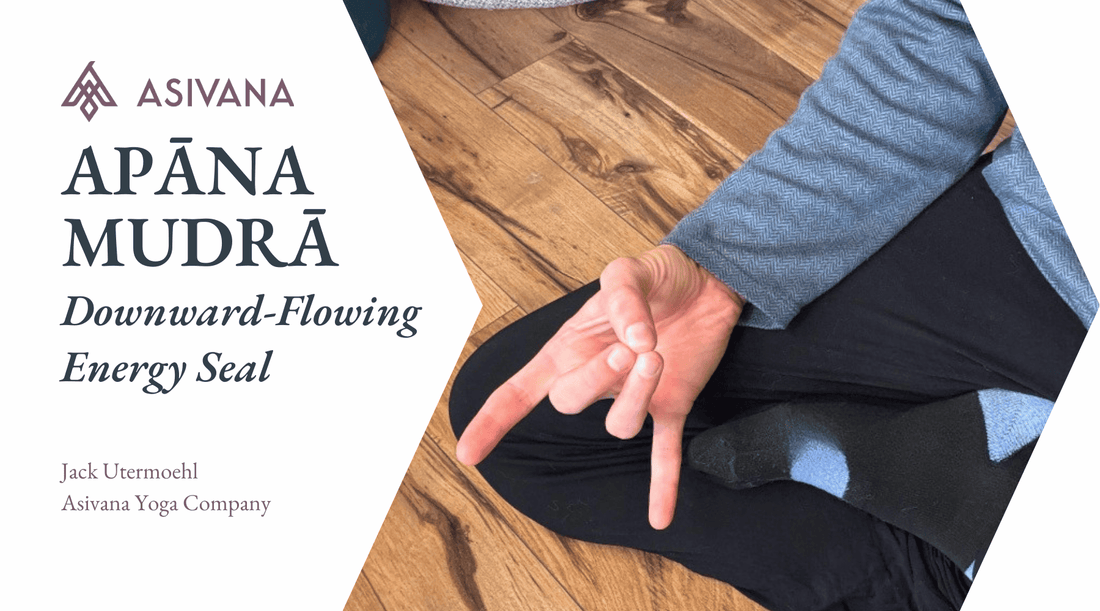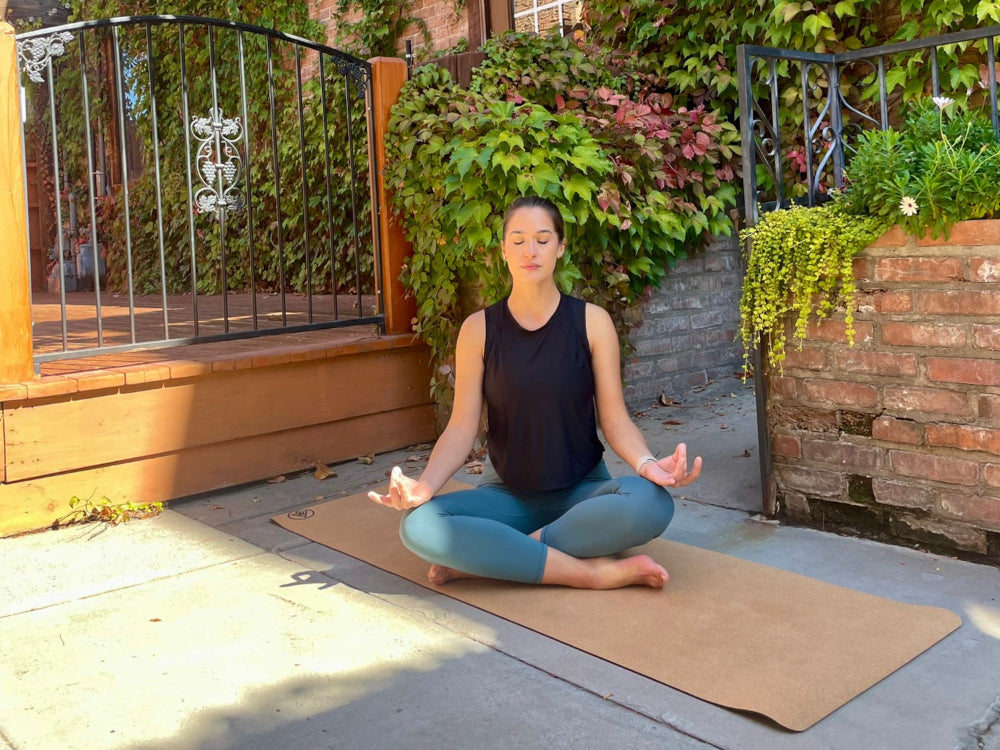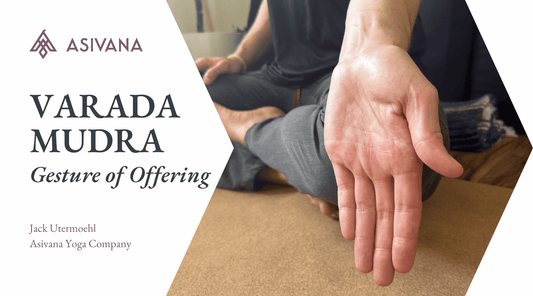
Apana Mudra - Downward-Flowing Energy Seal
Jack UtermoehlShare
Apana means "air moving downward," and Apana Vayu is the vital energy responsible for all processes of elimination on a physical, mental, and emotional level. This mudra activates that descending current of prana, guiding it through the pelvis, lower abdomen, and legs.
Sometimes called the “gesture of purifying energy,” this mudra supports digestion, menstruation, and emotional letting go. By cultivating downward flow, Apana Mudra helps us ground, release, and return to balance.
It nourishes the pelvic organs, eases pressure in the lower body, and helps dissolve physical and energetic stagnation. Through conscious breath and attention, it guides the practitioner into a deeper state of rootedness, clarity, and release.
Sanskrit Name: Apāna Mudrā – अपान मुद्रा
English Translation: Gesture of the Downward Current of Purifying Energy
Phonetic Spelling: uh-paa-nuh moo-drah
This mudra works subtly and steadily, allowing stuck energy to loosen and move. Whether used for physical elimination or emotional detoxification, it reminds us that healthy release is a vital part of wholeness.
Apana Mudra is especially useful in modern times, when overstimulation, overconsumption, and emotional tension are common. With regular practice, it invites inner spaciousness and freedom from attachment.

Instructions to Perform Apana Mudra
Choose a seated posture such as sukhasana (easy pose), vajrasana (thunderbolt pose), or sit upright in a chair. Allow your spine to lengthen naturally and your shoulders to soften downward.
Hand Position: Touch the tips of the middle and ring fingers to the thumb on each hand. Extend the index and little fingers outward.
Placement: Rest the backs of your hands on the thighs or knees with the palms facing upward.
Breathing Technique: Practice slow, deep exhalations. With each inhale, gather awareness in the lower belly. With each exhale, feel the breath descending and releasing.
Duration: Hold for 2 minutes. Begin with shorter sessions and increase over time as needed.
Benefits of Apana Mudra
This mudra enhances the downward flow of prana, encouraging elimination, relaxation, and stability. It is especially helpful for releasing what is no longer needed and restoring balance to the lower chakras.
Physical Benefits: Stimulates elimination, supports digestion, reduces cramping and bloating, lowers blood pressure.
Mental Benefits: Helps reduce mental tension and restlessness, bringing clarity through the act of release.
Emotional Benefits: Encourages the letting go of old stories, attachments, or energetic weight. Cultivates groundedness and emotional security.
Spiritual Benefits: Supports vairāgya (non-attachment), the ability to surrender what no longer serves and come into deeper alignment with inner truth.
Elevate Your Mudra Practice
Capture your insights and deepen your connection with our Yoga Journal.
Symbolism and Meaning of Apana Mudra
Apana Mudra represents the power of downward movement of composting, releasing, and transmuting. The ring and middle fingers connect to the earth and ether elements, while the thumb signifies fire, suggesting the transformation of dense matter into subtle energy. The extended fingers open channels for expression and spaciousness.
Its gesture is both humble and liberating. By bowing toward what we no longer need, we allow the inner space for new growth. Practicing Apana Mudra can become a ritual of purification, inviting us to breathe deeper, soften our resistance, and feel safe in letting go.
When to Practice Apana Mudra
Practice Apana Mudra when you need to ground, process, or release:
- To support digestion or elimination
- During menstruation to ease cramping and flow
- When feeling emotionally heavy or stuck
- To relax before sleep or after a stressful day
- During meditation when working with the root or sacral chakras
Suggested duration: 5–15 minutes, up to 2 times per day as needed.
Contraindications for Apana Mudra
- Use caution if pregnant. Avoid prolonged holds or consult a qualified teacher.
- Those with hypotension (low blood pressure) should monitor closely and reduce duration as needed.
- Practice with awareness if feeling mentally or emotionally ungrounded.
Additional Insights on Apana Mudra
Affirmations: “I release what no longer serves.” / “I am grounded, clear, and free.”
Visualization: Envision a gentle stream flowing downward from your navel into the earth. With each breath, let the stream wash away old patterns, tension, or stuck emotion leaving space for renewal.
Associated Chakras: Mūlādhāra (Root) and Svādhiṣṭhāna (Sacral).
Paired Asanas: Malasana (garland pose), Apanasana (knees-to-chest), Supta Baddha Konasana (reclining bound angle).
Related Pranayama: Chandra Bhedana (left-nostril breathing) for calming, or extended exhale breath ratios.
Meditation Techniques: Practice with silent mantra (“Let go”) or breath-led awareness into the hips and pelvis.
Variations and Modifications
Alternative Hand Positions: Hands may rest lower, near the knees or hips, to intensify the grounding effect. You may also use a cushion or prop under the hands to stay comfortable.
Adaptations for Beginners: Begin with shorter durations and keep breath awareness simple. Try pairing with relaxing music or guided meditation for emotional ease.
—— 🕉 ——

Personal Insights
Apana mudra is one of the mudras of vayu (air) and it's designated as the downward flowing vayu.
For me, I rarely need to feel this downward air element however I have enjoyed its grounding energetic experience and use when needing to encourage bowel movement.
An interesting note, it's possible the character Appa from Avatar: The Last Airbender was named after this downward flowing air.
Appa is a flying bison that lives in harmony with the airbenders of the southern air temple. One of my favorite shows and one with some deep philosophy and situations despites it's cartoon appearance.
Let me know your experience in the comments below.











